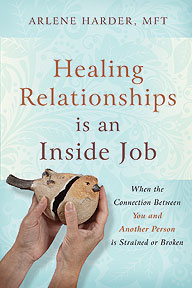There is hardly anything worse that that feeling of a knot in your stomach and thoughts that torment you when you know that one of your relationship is on the rocks. Perhaps you stepped to far with that last comment, perhaps you are feeling abandoned, or perhaps you can’t seem to figure out how to reconnect with someone who you once held so dear. “Healing Relationships is an Inside Job” by Arlene Harder, MFT might be the perfect guide for you.
Right from the get-go, Arlene Harder outlines the stages we tend to move through when addressing a tarnished relationships:
 “STAGE ONE: Recognizing that the expectations for a relationship with someone have not been met.
“STAGE ONE: Recognizing that the expectations for a relationship with someone have not been met.
STAGE TWO: Trying to get the other person to change through manipulation, anger, blame, and guilt — and finding none of these tactics work.
STAGE THREE: Looking closely at what we may be doing to perpetuate the situation and at the steps we can take to approach our relationship from a more positive perspective.
STAGE FOUR: If working on ourselves does not change the other person, or help us find a solution to the issues that divide us, then this is a time of grieving for that which is not possible and for releasing the past.
STAGE FIVE: Resolving to accept life as it unfolds without demanding the other person, and our relationship with him or her, turn out exactly the way we want things to turn out.” – p. ii
In attempting to mitigate relational struggles, the average person tends to find themselves somewhere around phase two: conniving, planning, and plotting to make the other party act the way you wish them to act. In the end, our efforts in this area are fruitless at best, selfish at worse. We can not decide what is the best for another person. They must decide and act on their own accord. To do otherwise induces a power struggle, where one party decrees what is “right” and “appropriate,” while the other looses its sense of empowerment. If you truly love someone and want to improve your rapport with them, wouldn’t you want them to be strong and able to act with confidence from the core of their being rather than only making decisions to please you?
We like to shift the blame to “the other guy,” but in the end, the only person we have any control over is ourselves. Taking the advice to heart from “Healing Relationships” is no walk in the park. Harder emphasizes, over and over, the necessity of working, first and foremost, on yourself:
“What I have learned over many years is that if you are to heal your relationship — or at a minimum heal your heart — you need to be willing to explore what it is within yourself that contributes to difficulties in the relationship.”- p. iii
Isolate, identify, and work on your negative habits that account for your share of a tense relationship. Beyond that, “Healing Relationships” encourages and demonstrates – through both instruction and storytelling – the art of letting go, of accepting others for who they’ve chosen to be, especially when it does not fall in line with what you expect of them.
Harder does note that being a perfectionist can bring its own challenges to this journey of healing one’s relationships. Strained relations with another person will never quite return to square one; a clean relationship-slate is simply not a possibility. A habitual perfectionist would probably not be inclined to start working through the knots of a tenuous relationship if that process can’t be executed seamlessly. It is important, however, to temper those all-or-nothing tendencies if any progress is to be made, for it is much better to make even an ounce of progress rather than none at all.
From reading “Healing Relationships is an Inside Job,” you will be given the tools to greatly improve your relationships, and color your approach to those relationships with an increasingly open-hear and curious spirit, continually more welcoming of the possible outcomes of that relationship. Take the next steps you know you need to take and fight for those relationships that matter most.
Posted by Sarah Adams, Personhood Press Blog Writer